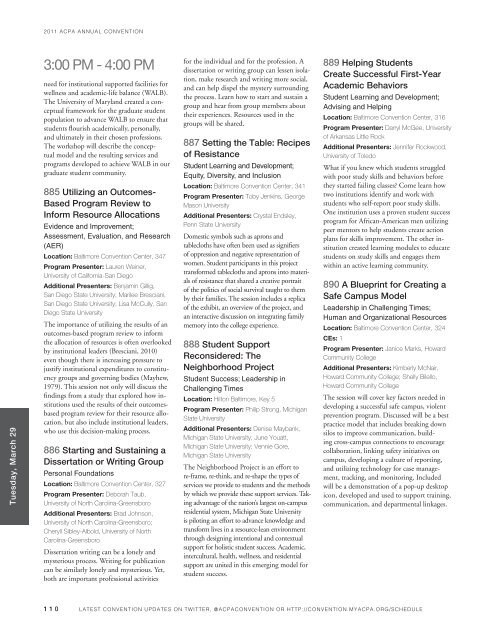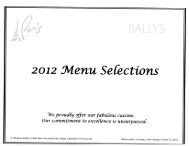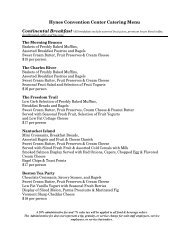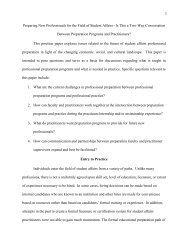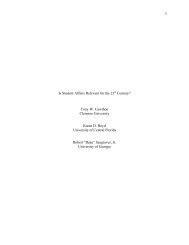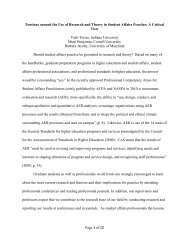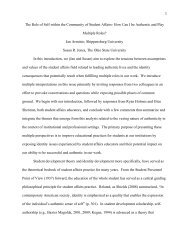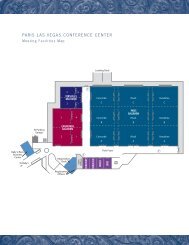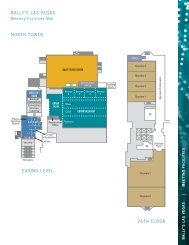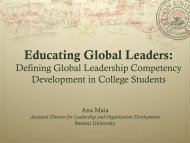Dear ACPA Colleagues: - ACPA 2014 Indianapolis Convention
Dear ACPA Colleagues: - ACPA 2014 Indianapolis Convention
Dear ACPA Colleagues: - ACPA 2014 Indianapolis Convention
Create successful ePaper yourself
Turn your PDF publications into a flip-book with our unique Google optimized e-Paper software.
Tuesday, March 29<br />
2011 aCpa annuaL <strong>Convention</strong><br />
3:00 PM - 4:00 PM<br />
need for institutional supported facilities for<br />
wellness and academic-life balance (WALB).<br />
The University of Maryland created a conceptual<br />
framework for the graduate student<br />
population to advance WALB to ensure that<br />
students flourish academically, personally,<br />
and ultimately in their chosen professions.<br />
The workshop will describe the conceptual<br />
model and the resulting services and<br />
programs developed to achieve WALB in our<br />
graduate student community.<br />
885 Utilizing an Outcomes-<br />
Based Program Review to<br />
Inform Resource Allocations<br />
Evidence and Improvement;<br />
Assessment, Evaluation, and Research<br />
(AER)<br />
Location: Baltimore <strong>Convention</strong> Center, 347<br />
Program Presenter: Lauren Weiner,<br />
University of California-San Diego<br />
Additional Presenters: Benjamin Gillig,<br />
San Diego State University; Marilee Bresciani,<br />
San Diego State University; Lisa McCully, San<br />
Diego State University<br />
The importance of utilizing the results of an<br />
outcomes-based program review to inform<br />
the allocation of resources is often overlooked<br />
by institutional leaders (Bresciani, 2010)<br />
even though there is increasing pressure to<br />
justify institutional expenditures to constituency<br />
groups and governing bodies (Mayhew,<br />
1979). This session not only will discuss the<br />
findings from a study that explored how institutions<br />
used the results of their outcomesbased<br />
program review for their resource allocation,<br />
but also include institutional leaders,<br />
who use this decision-making process.<br />
886 Starting and Sustaining a<br />
Dissertation or Writing Group<br />
Personal Foundations<br />
Location: Baltimore <strong>Convention</strong> Center, 327<br />
Program Presenter: Deborah Taub,<br />
University of North Carolina-Greensboro<br />
Additional Presenters: Brad Johnson,<br />
University of North Carolina-Greensboro;<br />
Cheryll Sibley-Albold, University of North<br />
Carolina-Greensboro<br />
Dissertation writing can be a lonely and<br />
mysterious process. Writing for publication<br />
can be similarly lonely and mysterious. Yet,<br />
both are important professional activities<br />
for the individual and for the profession. A<br />
dissertation or writing group can lessen isolation,<br />
make research and writing more social,<br />
and can help dispel the mystery surrounding<br />
the process. Learn how to start and sustain a<br />
group and hear from group members about<br />
their experiences. Resources used in the<br />
groups will be shared.<br />
887 Setting the Table: Recipes<br />
of Resistance<br />
Student Learning and Development;<br />
Equity, Diversity, and Inclusion<br />
Location: Baltimore <strong>Convention</strong> Center, 341<br />
Program Presenter: Toby Jenkins, George<br />
Mason University<br />
Additional Presenters: Crystal Endsley,<br />
Penn State University<br />
Domestic symbols such as aprons and<br />
tablecloths have often been used as signifiers<br />
of oppression and negative representation of<br />
women. Student participants in this project<br />
transformed tablecloths and aprons into materials<br />
of resistance that shared a creative portrait<br />
of the politics of social survival taught to them<br />
by their families. The session includes a replica<br />
of the exhibit, an overview of the project, and<br />
an interactive discussion on integrating family<br />
memory into the college experience.<br />
888 Student Support<br />
Reconsidered: The<br />
Neighborhood Project<br />
Student Success; Leadership in<br />
Challenging Times<br />
Location: Hilton Baltimore, Key 5<br />
Program Presenter: Philip Strong, Michigan<br />
State University<br />
Additional Presenters: Denise Maybank,<br />
Michigan State University; June Youatt,<br />
Michigan State University; Vennie Gore,<br />
Michigan State University<br />
The Neighborhood Project is an effort to<br />
re-frame, re-think, and re-shape the types of<br />
services we provide to students and the methods<br />
by which we provide these support services. Taking<br />
advantage of the nation’s largest on-campus<br />
residential system, Michigan State University<br />
is piloting an effort to advance knowledge and<br />
transform lives in a resource-lean environment<br />
through designing intentional and contextual<br />
support for holistic student success. Academic,<br />
intercultural, health, wellness, and residential<br />
support are united in this emerging model for<br />
student success.<br />
889 Helping Students<br />
Create Successful First-Year<br />
Academic Behaviors<br />
Student Learning and Development;<br />
Advising and Helping<br />
Location: Baltimore <strong>Convention</strong> Center, 316<br />
Program Presenter: Darryl McGee, University<br />
of Arkansas Little Rock<br />
Additional Presenters: Jennifer Rockwood,<br />
University of Toledo<br />
What if you knew which students struggled<br />
with poor study skills and behaviors before<br />
they started failing classes? Come learn how<br />
two institutions identify and work with<br />
students who self-report poor study skills.<br />
One institution uses a proven student success<br />
program for African-American men utilizing<br />
peer mentors to help students create action<br />
plans for skills improvement. The other institution<br />
created learning modules to educate<br />
students on study skills and engages them<br />
within an active learning community.<br />
890 A Blueprint for Creating a<br />
Safe Campus Model<br />
Leadership in Challenging Times;<br />
Human and Organizational Resources<br />
Location: Baltimore <strong>Convention</strong> Center, 324<br />
CEs: 1<br />
Program Presenter: Janice Marks, Howard<br />
Community College<br />
Additional Presenters: Kimberly McNair,<br />
Howard Community College; Shelly Bilello,<br />
Howard Community College<br />
The session will cover key factors needed in<br />
developing a successful safe campus, violent<br />
prevention program. Discussed will be a best<br />
practice model that includes breaking down<br />
silos to improve communication, building<br />
cross-campus connections to encourage<br />
collaboration, linking safety initiatives on<br />
campus, developing a culture of reporting,<br />
and utilizing technology for case management,<br />
tracking, and monitoring. Included<br />
will be a demonstration of a pop-up desktop<br />
icon, developed and used to support training,<br />
communication, and departmental linkages.<br />
110 Latest <strong>Convention</strong> updates on twitter, @aCpa<strong>Convention</strong> or http://<strong>Convention</strong>.myaCpa.org/sCheduLe


